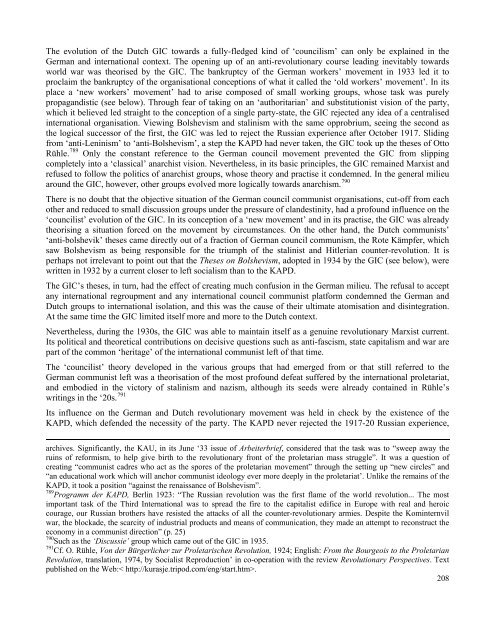The German-Dutch Communist Left - Libcom
The German-Dutch Communist Left - Libcom
The German-Dutch Communist Left - Libcom
Create successful ePaper yourself
Turn your PDF publications into a flip-book with our unique Google optimized e-Paper software.
<strong>The</strong> evolution of the <strong>Dutch</strong> GIC towards a fully-fledged kind of ‘councilism’ can only be explained in the<br />
<strong>German</strong> and international context. <strong>The</strong> opening up of an anti-revolutionary course leading inevitably towards<br />
world war was theorised by the GIC. <strong>The</strong> bankruptcy of the <strong>German</strong> workers’ movement in 1933 led it to<br />
proclaim the bankruptcy of the organisational conceptions of what it called the ‘old workers’ movement’. In its<br />
place a ‘new workers’ movement’ had to arise composed of small working groups, whose task was purely<br />
propagandistic (see below). Through fear of taking on an ‘authoritarian’ and substitutionist vision of the party,<br />
which it believed led straight to the conception of a single party-state, the GIC rejected any idea of a centralised<br />
international organisation. Viewing Bolshevism and stalinism with the same opprobrium, seeing the second as<br />
the logical successor of the first, the GIC was led to reject the Russian experience after October 1917. Sliding<br />
from ‘anti-Leninism’ to ‘anti-Bolshevism’, a step the KAPD had never taken, the GIC took up the theses of Otto<br />
Rühle. 789 Only the constant reference to the <strong>German</strong> council movement prevented the GIC from slipping<br />
completely into a ‘classical’ anarchist vision. Nevertheless, in its basic principles, the GIC remained Marxist and<br />
refused to follow the politics of anarchist groups, whose theory and practise it condemned. In the general milieu<br />
around the GIC, however, other groups evolved more logically towards anarchism. 790<br />
<strong>The</strong>re is no doubt that the objective situation of the <strong>German</strong> council communist organisations, cut-off from each<br />
other and reduced to small discussion groups under the pressure of clandestinity, had a profound influence on the<br />
‘councilist’ evolution of the GIC. In its conception of a ‘new movement’ and in its practise, the GIC was already<br />
theorising a situation forced on the movement by circumstances. On the other hand, the <strong>Dutch</strong> communists’<br />
‘anti-bolshevik’ theses came directly out of a fraction of <strong>German</strong> council communism, the Rote Kämpfer, which<br />
saw Bolshevism as being responsible for the triumph of the stalinist and Hitlerian counter-revolution. It is<br />
perhaps not irrelevant to point out that the <strong>The</strong>ses on Bolshevism, adopted in 1934 by the GIC (see below), were<br />
written in 1932 by a current closer to left socialism than to the KAPD.<br />
<strong>The</strong> GIC’s theses, in turn, had the effect of creating much confusion in the <strong>German</strong> milieu. <strong>The</strong> refusal to accept<br />
any international regroupment and any international council communist platform condemned the <strong>German</strong> and<br />
<strong>Dutch</strong> groups to international isolation, and this was the cause of their ultimate atomisation and disintegration.<br />
At the same time the GIC limited itself more and more to the <strong>Dutch</strong> context.<br />
Nevertheless, during the 1930s, the GIC was able to maintain itself as a genuine revolutionary Marxist current.<br />
Its political and theoretical contributions on decisive questions such as anti-fascism, state capitalism and war are<br />
part of the common ‘heritage’ of the international communist left of that time.<br />
<strong>The</strong> ‘councilist’ theory developed in the various groups that had emerged from or that still referred to the<br />
<strong>German</strong> communist left was a theorisation of the most profound defeat suffered by the international proletariat,<br />
and embodied in the victory of stalinism and nazism, although its seeds were already contained in Rühle’s<br />
writings in the ‘20s. 791<br />
Its influence on the <strong>German</strong> and <strong>Dutch</strong> revolutionary movement was held in check by the existence of the<br />
KAPD, which defended the necessity of the party. <strong>The</strong> KAPD never rejected the 1917-20 Russian experience,<br />
archives. Significantly, the KAU, in its June ‘33 issue of Arbeiterbrief, considered that the task was to “sweep away the<br />
ruins of reformism, to help give birth to the revolutionary front of the proletarian mass struggle”. It was a question of<br />
creating “communist cadres who act as the spores of the proletarian movement” through the setting up “new circles” and<br />
“an educational work which will anchor communist ideology ever more deeply in the proletariat’. Unlike the remains of the<br />
KAPD, it took a position “against the renaissance of Bolshevism”.<br />
789 Programm der KAPD, Berlin 1923: “<strong>The</strong> Russian revolution was the first flame of the world revolution... <strong>The</strong> most<br />
important task of the Third International was to spread the fire to the capitalist edifice in Europe with real and heroic<br />
courage, our Russian brothers have resisted the attacks of all the counter-revolutionary armies. Despite the Kominternvil<br />
war, the blockade, the scarcity of industrial products and means of communication, they made an attempt to reconstruct the<br />
economy in a communist direction” (p. 25)<br />
790 Such as the ‘Discussie’ group which came out of the GIC in 1935.<br />
791 Cf. O. Rühle, Von der Bürgerlicher zur Proletarischen Revolution, 1924; English: From the Bourgeois to the Proletarian<br />
Revolution, translation, 1974, by Socialist Reproduction’ in co-operation with the review Revolutionary Perspectives. Text<br />
published on the Web:< http://kurasje.tripod.com/eng/start.htm>.<br />
208
















